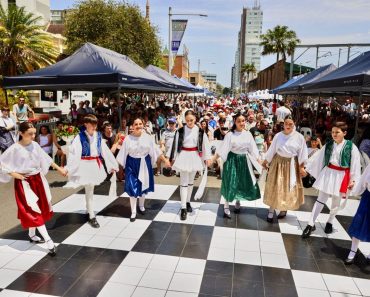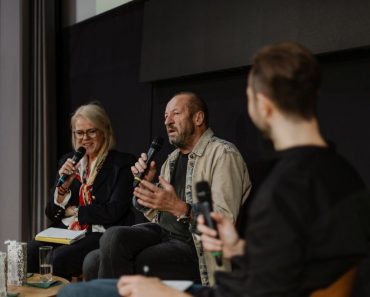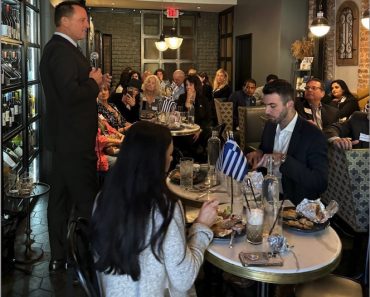Evanthia Reboutsika and Tassos Boulmetis delivered a masterclass titled “The Director’s Sound and the Composer’s Vision” on Tuesday, November 5th, at the packed Pavlos Zannas theater. The event was held in the framework of the Meet the Future action of the Thessaloniki Film Festival, which aims to showcase young Greek professionals from different branches of cinema. This year’s Meet the Future of the 65th TIFF brings to the fore the art of film scoring through the tribute “Music in Motion: The Art of Film Scoring” and welcomes film music composers of the younger generation from Greece. The masterclass discussed topics such as music at the script writing and preparation stage, the relationship between director and musician before and after shooting, themes, motifs and bridges in a film score, sound clips, as well as the relationship between sound design and music. The masterclass was moderated by Christos Gousios, Professor of Sound at the Film School of the Aristotle University of Thessaloniki.
The masterclass was prefaced by the artistic director of the Festival, Orestis Andreadakis: “20-21 years ago Thymios Panagiotidis, a distributor and a very good friend of the Festival, told me to definitely watch the film A Touch of Spice. At that time there were no videos, maybe I watched it in Thymios’ office or on the first day it was shown in cinemas. I remember the trailer starts with this wonderful music, with the mandolin, lasts about 20 seconds, and suddenly the orchestra comes in. Then the images from Tassos Boulmetis’ film follow, and I remember saying to myself that a great success is in store, a great collaboration, which actually continued for three more films. I won’t say more: they will tell you themselves, Tassos Boulmetis and Evanthia Reboutsika. Thank you very much for being with us. And on this occasion, I would like to thank the Film School, the professors and students who are participating”, he concluded, giving the floor to the moderator of the discussion, Christos Gousios.
“I would also like to thank you for the special honor of moderating this masterclass. I would like to thank the Festival for this invitation. This series of masterclasses has a profound educational benefit for our department, as there is an opportunity for all the young people attending our school to hear all these important artists talk about their collaborations and also to learn about how all these outstanding works have come about,” he said. He then proceeded to give a brief introduction of the speakers: “Evanthia Reboutsika is a very popular musician, known for her music, but also for the music she has composed for film. After many years of experience in television, she composed the music for A Touch of Spice, which established her presence in the field of film music. However, her relationship with cinema began in her childhood, as her father was a cinema owner. She has received multiple awards for her work and continues her activity in music, both film music and more generally,” he initially said.
Immediately afterwards, Christos Gousios spoke about Tassos Boulmetis: “Tassos Boulmetis managed, with his second film in 2003, to present the biggest box office success in our country, with an unimaginable number of tickets that reached one and a half million. It was preceded by The Dream Factory and followed by Mythopathy and 1968. In his last three films the music was the product of a collaboration with Evanthia Reboutsika. But what is evident, if one follows the work of Tassos Boulmetis, is that he has a great sensitivity to the soundtrack. And when I say soundtrack, apart from music, I include sound in the context of the word. This is a man who cares about the sound part, I would dare to say on a par with the image part. Also, one of his characteristics is that he enjoys the educational process and is very happy to share his experiences with young and budding creatives,” he concluded.
At this point, and talking about the beginning of their collaboration, Evanthia Reboutsika said: “Tassos and I have known each other for many, many years, long before A Touch of Spice. I never expected to make a film together. In fact, I didn’t expect to write music for film in general. I thought I would be a solo violinist. Tassos and I met in Istanbul in 2000. It was Easter, I remember. He took us around to all the places he used to hang out as a kid, in the neighborhoods, at his house, at the playground where he used to swing, at his school, he even introduced us to his former teacher. I was very moved by the story of Tassos and his family. One evening we met in a hotel by the Bosphorus, and then he proposed to work with me, and here I accepted with great pleasure. It was my first film. Before that, I worked intensively in television. As far as the film was concerned, my close relationship with Tassos was very helpful.”
Subsequently, Tassos Boulmetis said: “Evanthia has oriental roots. Her father had graduated from the Theological School of Halki. Once, her father had come to my house, where I have a manuscript of Byzantine music from the 16th century, written by a monk. Then he began to chant; it was one of the most magical moments I experienced in my house, and of course we have honored him in a scene of A Touch of Spice.” Evanthia Reboutsika discussed her relationship with cinema and music, which had its start in her childhood: “I grew up in a cinema. My father very much wanted to be a director, but he couldn’t, so he opened a cinema. My mother was caught in the pains of childbirth at the cinema box office. Years later, I found myself back in the film business. It’s like living in a darkened room, with sometimes colored images and sometimes black and white images alternating in front of me. Cinema for me is a very great love, it is my life I can say. I literally lived in it, along with the films I watched and the theater repertories with clowns my father used to bring. At the same time, I lived in a house that was overflowing with music, as my dad was a chanter. A house where four of the six brothers and sisters were involved in music. My entire childhood was based on film and music, memories that I carry with me to this day.”
Answering a question from Christos Goussios about the music in A Touch of Spice, Tassos Boulmetis explained: “The first thing I did was to meet with Evanthia. I wanted to somehow mobilize her imagination and make her understand my feelings as well. Immediately afterwards, I gave her the script, which she read long before shooting started. Evanthia gave me four musical themes, which were all wonderful. From these themes we came up with two. I was inspired by these themes, they opened up paths for me and shaped the ambiance of the film. A Touch of Spice is a film that has a lot of musical themes, an element that did not work negatively on the audience,” he said.
As for his methodology as a director, Tassos Boulmetis elaborated: “I am one of the directors who write the scripts themselves. This practice hides many problems and many pitfalls, and is also extremely time-consuming. I usually don’t know what the ending of the film will be, but I do know what feeling I want to evoke when the viewer leaves after the film. In other words, I create a feeling rather than looking for a dramatic solution. The feeling is my guide. It is what guides me both in the field of music and dramatically. When I write the script, I am locked into certain musical sounds. By the time I finish the script, I am living in music. Slowly, those bits and pieces of music come together and I can connect the scenes together much more easily.”
At this point, and commenting on her own working methodology, Evanthia Reboutsika said: “I go completely by instinct. When Tassos gave me the script I read it, and while I was reading it I thought I was living in the film, I felt like a protagonist. I started walking around outside and thinking of things I wanted to write. I write with a mandolin and a piano, my score, my pencil, or even a pen because I don’t erase easily. As I watch the film, I try to hum the image. It’s like I’m walking and traveling with it. This journey makes me write down all that I saw in the picture. Of course, it also plays a very important role which director you are dealing with. Tassos Boulmetis gave me freedom and I thank him.”
Regarding the use of temp music, i.e. a temporary music composition for the needs of the editing, Tassos Boulmetis said: “At some point, Yorgos Mavropsaridis told me that he needs music to edit, and that without music he cannot proceed. There, as a director I am forced to find something that rhythmically fits the ambiance of the scene. I have confidence in Evanthia because she is not influenced by temp music.” He then showed some footage of some original 3D renderings from the film A Touch of Spice juxtaposed with the actual scenes.
Regarding the assignments to the music composers and temp scores, Evanthia Reboutsika said: “My goal is always to create my own identity. That is, I have the ability to listen to the temp score without being influenced at all. If you let yourself go and let your instincts work, you will achieve very nice things. Let your inspiration fly like a bird and you will find yourself. Musical composition is equivalent to psychoanalysis, to a game. Let yourself flow like a river because it will end up somewhere. I prefer not to listen to temp scores because I want what’s inside me to come out. I want to dream alone of the aromas and colors of Istanbul, of the stories of Tassos, of the journey we made together in Istanbul.”
Next, and about the importance of the script in his work, Tassos Boulmetis stressed: “I’m terribly organized and I believe that the film is made before shooting. On the set everything has to be ready already. Many unforeseen problems can arise, of course. The shooting should be sort of ‘boring’ for the director. When I have 60% or 70% of what I have in mind, then I’m ready to shoot. I want to go into the shoot knowing that I have secured what I have in my head. Very rarely do I feel insecure or that I’m not prepared for something. Besides, directors feel an incredible loneliness, because no one understands what is in their mind. Of all the collaborators that surround the director, the musician is the only one who feels the same loneliness. Also, you can never predict what the outcome will be.” Immediately afterwards, he projected a favorite scene from his own film, Mythopathy, juxtaposed with a test scene he had shot as a rehearsal. He also showed a storyboard for Mythopathy, full of sound and images, a tactic he follows in every film he makes.
At this point, the conversation opened up to the audience. Evanthia Rebucica, in response to a question about how she writes music, said: “I never stopped writing exactly as I started, I’ve never sat down at a computer. Music composition came into my life at a very bad time when I was on the floor, and it offered me a light to move on more easily. I also believe that a musician working for film should familiarize themselves with the history of film music, the great composers and their sounds. They should not only stick to the present, but also get to know musicians from the past. For example, I am a great fan of Ennio Moricone. I always think that writing music for film is not easy, it has to take root in us, we have to listen, read and search.” At the same time, she clarified that she doesn’t like a film to be loaded with music: “I want breaths, pauses and pauses. I want there to be long shots with nature sounds and room sounds. When music is used too much, it’s like it burns for me.
When asked by the audience about disagreements that have arisen over the years of their collaboration, the two collaborators agreed that, aside from a few creative disagreements, they have never come to blows. Tassos Boulmetis then answered a question about what profession he would have chosen if he had not become a director: “What excites me is sound design, if I didn’t become a director I would definitely become a sound designer. I am sort of a ‘sound nerd’. Even to write the script, in some scenes I listen to sounds for the specific ambiance. In the film A Touch of Spice we didn’t have a sound designer, I made the sounds myself on a flat screen computer in 2002, with a huge 150-euro microphone and a cable. All the sound in A Touch of Spice is mine”.
Evanthia Reboutsika then stressed the importance of good sound mixing in cinema, stating that it is the most important thing. Tassos Boulmetis referred overall to the enormous importance that the sound effect in his films has for him: “Sound is much cheaper than image. We are talking about 1/10, maybe 1/20 of the cost of the image. However, in the final result it can be 50% or even 60% of the film. It’s incredible the potential that sound editing has, we’re dealing with an area of great creativity. With good sound design you can add great volume and production value to your film.” On technology, he said that it is an ally of the filmmaker, as is AI: “Don’t be swayed by the completely negative climate around AI. It goes without saying that there can be misuse. You can get a little misguided and confused a bit about what is yours and what is not. The same applies to music,” concluded Evanthia Reboutsika.
On the issue of power relations between director and composer, Tassos Boulmetis said: “This issue has never been a concern of ours with Evanthia. Any disagreement we have discussed and resolved very creatively. I remember how the late Vangelis used to give you a piece saying ‘take it or leave it’. Evanthia was never like that. It depends of course on what everyone has signed in their contracts. We have a very nice creative partnership, without the slightest conflict.
Finally, regarding his way of working and how he mobilizes his inspiration, Tassos Boulmetis commented: “Inspirations are infinite and everyone works differently. At least in Europe we start from ideas and stimuli we have inside. In Europe, at least in Europe, we come from ideas and ideas we get from our everyday life and from our past, from what is happening around us. Right now I have an idea that I’ve been working on for three years. I have dedicated myself to it and I am trying to find a creative outlet.” On the same topic, Evanthia Reboutsika added: “In general, I walk too much to get inspired. The things that end up inspiring me are very simple, black and white, light and dark, a condition that also resembles the darkened cinema hall.”







